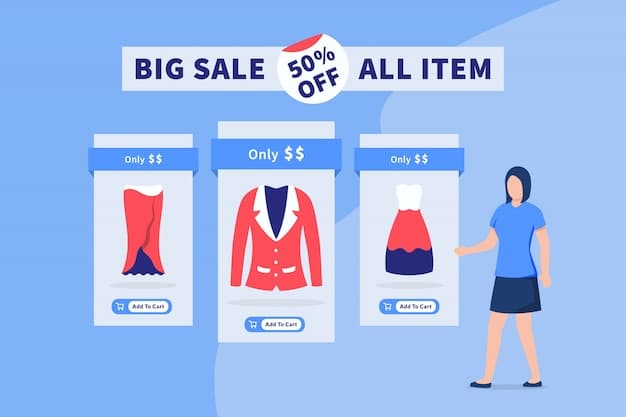Shein Copyright Lawsuit: US Impact on Consumers Detailed

Anúncios
Shein faces a new copyright lawsuit in the US, raising concerns about its design practices and potentially impacting consumers through changes in product availability and pricing.
The fast-fashion giant Shein faces a new copyright lawsuit in the US, adding to the growing scrutiny of its design and business practices. This legal challenge could have significant implications for consumers, potentially affecting product availability and pricing. Let’s delve into the details of the lawsuit and explore its possible impact.
Anúncios
Shein’s Mounting Legal Challenges
Shein, the online retail behemoth, has been rapidly expanding its global presence, captivating consumers with its trendy and affordable clothing. However, this success has been accompanied by a series of legal challenges, primarily concerning allegations of copyright infringement. These lawsuits paint a complex picture of a company navigating the murky waters of intellectual property protection in the fast-paced fashion industry.
Previous Copyright Allegations
Before this new lawsuit, Shein has faced multiple accusations of stealing designs from both independent artists and major brands. These allegations often involve strikingly similar clothing items and accessories appearing on Shein’s website shortly after being released by other designers.
- Previous lawsuits alleged that Shein copied designs from smaller, independent designers without permission or compensation.
- Several larger brands have also filed lawsuits against Shein, claiming infringement on trademarked logos or designs.
- These legal battles have raised ethical questions about Shein’s design process and oversight.
The fast-fashion industry by its very nature borrows heavily from trends and established designs. However, Shein’s alleged practices have led to accusations of blatant copying, blurring the line between inspiration and outright theft. The consequences of these lawsuits extend beyond financial compensation, potentially impacting Shein’s reputation and consumer trust.
Anúncios

The New Copyright Lawsuit Explained
The latest copyright lawsuit against Shein centers around specific allegations of design theft. While details are still emerging, this case appears to focus on a particular set of clothing items or designs that the plaintiff claims were copied directly by Shein.
Key Allegations in the Lawsuit
The lawsuit will likely detail specific instances where designs were allegedly copied, provide visual evidence, and quantify the damages sought. It could also target not only Shein but also its parent company and individual designers involved in the creation or sourcing of the allegedly infringing products.
- The lawsuit will likely claim that Shein knowingly and intentionally copied the plaintiff’s designs.
- Evidence will likely be presented comparing the original designs with the allegedly copied items sold by Shein.
- The plaintiff will seek financial compensation for lost sales, damages to their brand reputation, and legal fees.
This lawsuit highlights the challenges of protecting intellectual property in the digital age, where designs can be easily replicated and distributed across the globe. For Shein, the outcome of the case could set a precedent for future copyright disputes and force changes in its design and sourcing processes.
Potential Impact on US Consumers
While legal battles often seem distant from the everyday consumer, this copyright lawsuit against Shein could have several tangible effects on shoppers in the US. These impacts range from potential product shortages to price increases, and even changes in Shein’s overall business model.
Product Availability
If Shein is found liable for copyright infringement, it may be forced to remove certain products from its website, limiting the selection available to US consumers. This could particularly affect trendy or popular items that are at the center of the lawsuit claims.
Further, if found guilty and penalized severely, this could affect a larger range of products if Shein needs to pull back while restructuring their production proceedures.
A decrease in product offerings could lead to increased competition for remaining items, potentially driving up prices or leading to quicker sell-outs.
Price Fluctuations
The costs associated with defending against lawsuits and potentially paying damages could lead Shein to increase prices on its products. This could erode one of Shein’s main competitive advantages: its incredibly low prices.

The increased cost of products could make shoppers re-evaluate other fashion brands as potential sources.
Other potential price fluxes could stem from a need to prove that Shein is taking the copyright laws more seriously and are therefore having their internal and external teams focus more on proving that the product produced is authentic.
Shein’s Response and Countermeasures
In response to these copyright allegations, Shein typically asserts that it respects intellectual property rights and takes steps to prevent infringement. The company also often emphasizes that it has processes in place to investigate and remove allegedly infringing products from its platform.
Measures to Prevent Copyright Infringement
Shein may claim to have implemented measures such as design review processes, employee training on intellectual property law, and partnerships with third-party services to detect and remove infringing content.
There are also some rumors that Shein has been turning to AI as a measurement system.
The effectiveness of these measures, however, remains a subject of debate. Critics argue that Shein’s business model, which relies on rapidly producing a vast array of designs, inherently incentivizes copying and makes it difficult to adequately police its supply chain.
Potential Legal Strategies
In defending against the lawsuit, Shein could argue that the designs in question are not protectable under copyright law, or that there are significant differences between its products and the plaintiff’s designs. The company could also argue that any infringement was unintentional and that it took prompt action to remove the allegedly infringing products once it was notified.
Broader Implications for the Fashion Industry
This copyright lawsuit against Shein is not simply an isolated legal dispute. It raises broader questions about the fast-fashion industry’s impact on creativity, intellectual property, and ethical sourcing. The outcome of this case could have ripple effects across the entire industry, influencing how companies approach design, manufacturing, and marketing.
Impact on Independent Designers
A successful outcome for the plaintiff in this case could empower independent designers to more aggressively protect their intellectual property and challenge larger companies that they believe are engaging in copyright infringement. This could foster a more level playing field for smaller brands and incentivize creativity.
If Shein loses the case, this could also trigger many smaller brands to come forward.
Shein losing the case could set legal precedence which could benefit designers.
Ethical Considerations
The lawsuit also shines a light on the ethical considerations surrounding fast fashion. Critics argue that the industry’s relentless focus on speed and low prices often comes at the expense of fair labor practices, environmental sustainability, and intellectual property rights.
Conclusion
The copyright lawsuit against Shein in the US is a significant development with potentially far-reaching consequences for consumers, designers, and the fast-fashion industry as a whole. While the ultimate outcome of the case remains to be seen, it serves as a reminder of the importance of intellectual property protection, ethical business practices, and responsible consumerism.
| Key Aspect | Brief Description |
|---|---|
| ⚖️ Lawsuit Details | Shein faces a new copyright lawsuit in the US over alleged design theft. |
| 🛍️ Consumer Impact | Potential changes in product availability and pricing. |
| 🛡️ Shein’s Defense | Shein asserts it respects intellectual property and takes steps to prevent infringement. |
| 🌐 Industry Effects | Raises questions about fast fashion’s impact on creativity. |
Frequently Asked Questions
▼
The lawsuit alleges that Shein has copied designs from other companies without authorization, violating copyright laws in the US.
▼
If Shein is found guilty, it may be required to remove specific items that are deemed to infringe upon the designs in question.
▼
Yes, if Shein incurs significant costs in defending itself, including potential damages, it may raise prices to offset these expenses.
▼
Shein generally asserts that they respect intellectual property rights and has measures to prevent infringement, investigating claims and removing infringing products when notified.
▼
This lawsuit highlights ethical issues related to fast fashion’s impact on creativity, intellectual property, and the balance between affordability and originality.
Conclusion
The ongoing legal battle between Shein and its accusers underscores the complexities of copyright law in the fast-paced fashion industry. The ultimate resolution of this case will likely have a lasting impact on how online retailers protect intellectual property and how consumers perceive the value of original design.